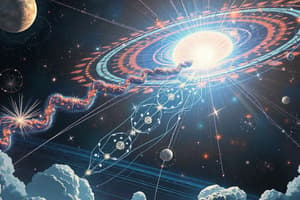Podcast
Questions and Answers
The statement 'science fact has become science fiction' indicates a clear understanding between scientific knowledge and public perception.
The statement 'science fact has become science fiction' indicates a clear understanding between scientific knowledge and public perception.
False (B)
Misinformation in the media can lead to the public overestimating the significance of scientific breakthroughs.
Misinformation in the media can lead to the public overestimating the significance of scientific breakthroughs.
True (A)
Simplifying complex scientific discoveries is necessary for engaging a broad audience, regardless of the accuracy.
Simplifying complex scientific discoveries is necessary for engaging a broad audience, regardless of the accuracy.
True (A)
Optimistic projections in science are always based on comprehensive and complete data.
Optimistic projections in science are always based on comprehensive and complete data.
Public fears regarding scientific advancements are often adequately addressed by clear scientific communication.
Public fears regarding scientific advancements are often adequately addressed by clear scientific communication.
Social media serves to amplify both accurate and inaccurate scientific information.
Social media serves to amplify both accurate and inaccurate scientific information.
Media outlets that sensationalize scientific findings help foster accurate perceptions of the current state of science.
Media outlets that sensationalize scientific findings help foster accurate perceptions of the current state of science.
The disconnect between public understanding and scientific discovery can lead to a sense of urgency in finding solutions.
The disconnect between public understanding and scientific discovery can lead to a sense of urgency in finding solutions.
Flashcards
Misuse of Science
Misuse of Science
Applying scientific knowledge incorrectly or in a way that doesn't consider the limitations or complexities of the science.
Oversimplification of Science
Oversimplification of Science
Reducing a complex scientific concept to a simpler, often inaccurate, version.
Hype in Science
Hype in Science
Exaggerating or overselling scientific breakthroughs to create excitement.
Misinformation in Media
Misinformation in Media
Signup and view all the flashcards
Unrealistic Projections
Unrealistic Projections
Signup and view all the flashcards
Public Anxiety about Science
Public Anxiety about Science
Signup and view all the flashcards
Social Media Misinformation
Social Media Misinformation
Signup and view all the flashcards
Selective Reporting
Selective Reporting
Signup and view all the flashcards
Study Notes
Misuse and Misinterpretation of Scientific Concepts
- The statement "science fact has become science fiction" suggests a disconnect between scientific understanding and its public perception or application.
- This disconnect may stem from a simplification of complex scientific concepts, leading to misunderstandings and unrealistic expectations.
Exaggerated Claims and Hype
- Misinformation and oversimplification contribute to the perception of scientific breakthroughs as more imminent or significant than they actually are.
- Hype surrounding scientific advancements can mislead the public and create unrealistic expectations about future possibilities. This can also apply to funding decisions and resource allocation.
Misrepresentation in Popular Media
- Popular science media often simplifies complex scientific discoveries or predictions to make them more engaging for a broad audience.
- This simplification can lead to an inaccurate understanding or distortion of scientific facts.
- Scientific findings may be presented out of context, or their limitations omitted, creating a false sense of certainty.
Overly Optimistic Projections
- Some scientific claims may be based on preliminary or incomplete data, leading to predictions that are later proven incorrect.
- The rapid pace of technological advancement can also create a sense of urgency for finding solutions to complex challenges, which can result in overly optimistic or unrealistic projections.
- The presentation of scientific possibilities may not adequately acknowledge the potential unknowns or limitations.
Public Misconceptions and Fears
- Scientific advancements may give rise to public anxieties or fears (e.g., genetic engineering, artificial intelligence).
- Misinterpretations of scientific research can fuel public discourse and contribute to the perception that science is outpacing societal readiness to handle its implications.
- Public concerns may not be adequately addressed by clear and credible scientific communication.
Role of Media and Social Media
- Social media platforms can amplify both accurate and inaccurate scientific information, sometimes spreading misinformation rapidly.
- Media outlets playing up sensational aspects can contribute to an inaccurate perception of the current state of science.
- Selective reporting and framing of scientific findings can create skewed perceptions of progress and implications for society.
Science Communication Gaps
- The need for effective communication between scientists and the public is critical in bridging the gap between scientific fact and public perception, preventing further misinterpretations and misappropriations of information.
- Scientists should actively engage with the public through various channels, explaining scientific methods, processes, and limitations.
- Scientists and science communicators must carefully consider their audience and tailor their messages appropriately.
Studying That Suits You
Use AI to generate personalized quizzes and flashcards to suit your learning preferences.




